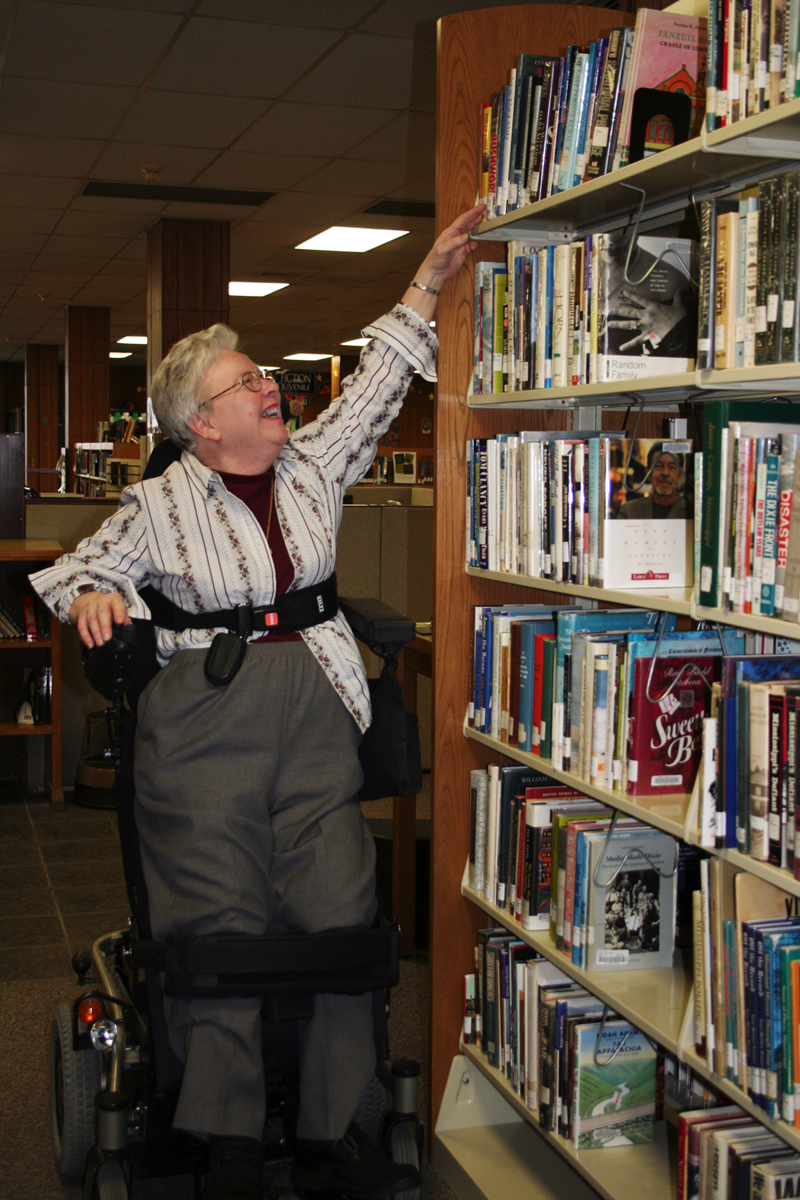LAUREL—Wheelchair user Drenda Barrett used to fear a literary avalanche every time she grabbed a book off an overhead shelf.
“I’ve pulled books down on my head a time or two – and some of our books are not light,” said the Laurel librarian.
So there’s no disguising her delight with a new power wheelchair that allows safe access to the library’s loftiest perches.
“You know what it is like when a child gets their favorite toy for Christmas? That’s how she reacted,” said Allison Fracchia, a Methodist Rehabilitation Center physical therapist who fitted Barrett with the Levo Combi standing wheelchair. “She could not stop smiling.”
The high-tech chair gets plenty of stares, and Barrett is not shy about showing off its capabilities. “Children are totally amazed,” she said. “And I want children to respond and ask questions – despite their parents saying shhh.”
When she’s in a seated position, Barrett can lower the wheelchair to scoot under a desk or raise it a few inches to extend her reach. But what she likes best is being able to rise to a standing position with a simple flick of a joystick.
“Don’t get me wrong, I’m thankful to be able to sit and do things,” she said. “But I can’t tell you how much I missed being on my feet. It’s a lot of fun to teach my Sunday school class standing up.”
Fracchia, a certified assistive technology practitioner and coordinator of Methodist Rehab’s assistive technology clinic, said wheelchair users can reap significant health benefits from being upright a portion of their day. The change in position helps prevent pressure sores and can improve circulation, respiration and digestion.
But the advantages aren’t all just physical. Barrett believes standing also has a positive impact on social interactions. “It’s amazing the difference in communication and reaction when you can be on the same level with the people you are talking to,” she said. “People respond better if you can look them in the eye.”
Although she contracted polio in 1952 at age 6, Barrett managed to do without walking aids for many years. But as her health deteriorated, she turned to forearm crutches and braces for support, and eventually relied on a walker and manual wheelchair to get around.
Ten years ago, she faced the tough transition of moving to a power wheelchair. “I remember her crying – it was a big deal,” Fracchia said. “It was hard because she felt like she was accepting a loss of function.”
“I won’t deny it, it was difficult emotionally,” Barrett said. “Now I think: What a fool was I. Using a power chair has increased my independence.”
Barrett was a Georgia school librarian for 25 years before retiring in 1992. And in the years since, she hasn’t strayed far from the company of books. Her frequent jaunts to the Laurel-Jones Library eventually caught the attention of Director Mary Louise Breland, who hired Barrett for the cataloging department as soon as she learned of her master’s degree in library and information science.
While coworkers have always helped Barrett compensate for her inability to reach high shelves, she was convinced a standing wheelchair would let her do the job independently. The problem was how to pay for it.
“Funding is a big issue,” said William Smith, an assistive technology supplier for Mobility Medical in Flowood, the vendor that provided Barrett’s wheelchair. “Standing wheelchairs retail for around $25,000 and most insurers run from those kinds of prices. She was fortunate that vocational rehabilitation stepped in and purchased it for her.”
Pam Hall, a Laurel vocational rehabilitation counselor for the Mississippi Department of Rehabilitation Services, said funding Barrett’s wheelchair fit the agency’s mission to help disabled people stay in the work force. “Now she is able to reach the top shelf to put books away and meet all the job demands of a librarian,” Hall said. “She has been so excited that she even did a commercial for the vendor.”
Fracchia said Barrett’s smile was ear-to-ear when the time finally came to be trained on the standing wheelchair. And she said it was rewarding to see Barrett adapt so well to the new technology. “We went into the hospital’s library so she could get a real feel of how she could utilize it at work and she was so grateful and so appreciative.
“It is those kinds of people who make me want to do what I do because I see what impact the proper equipment has on people’s lives. It gives them some independence back,” Fracchia said.

